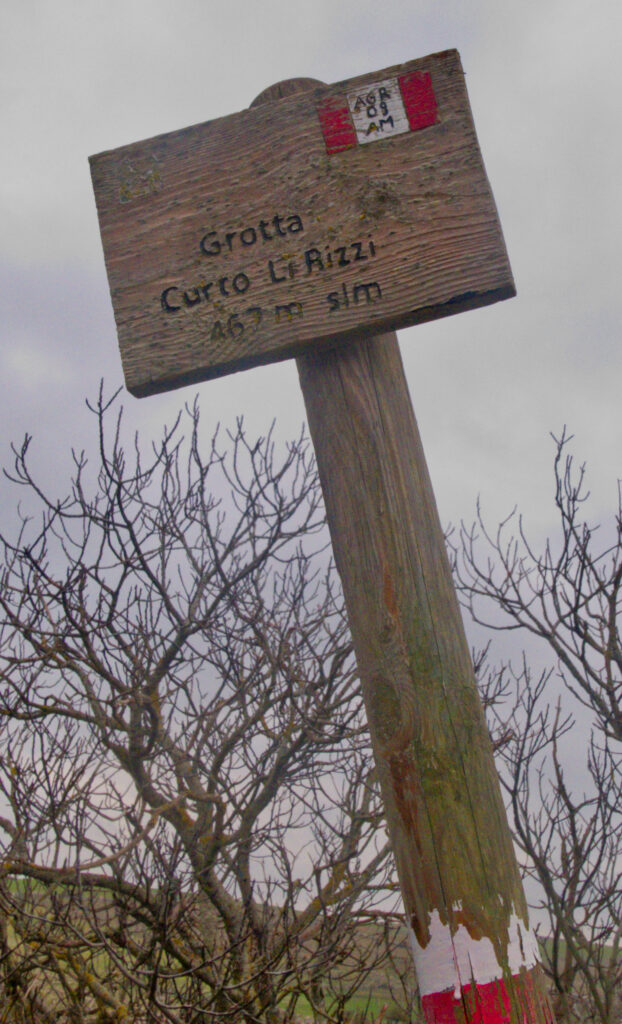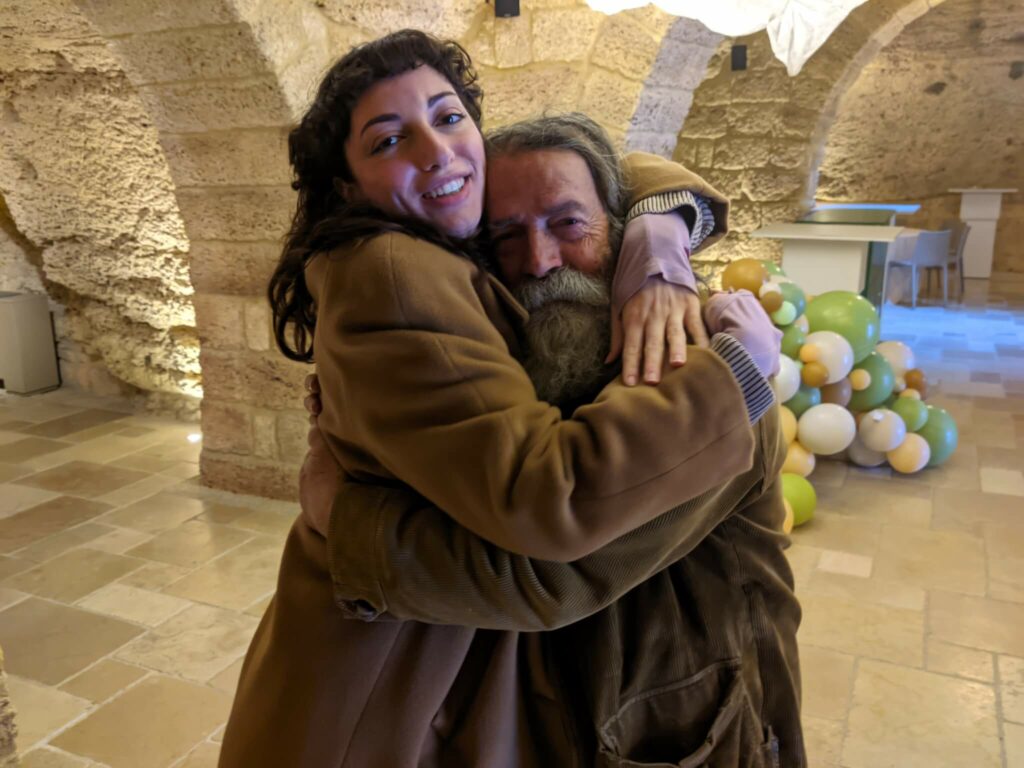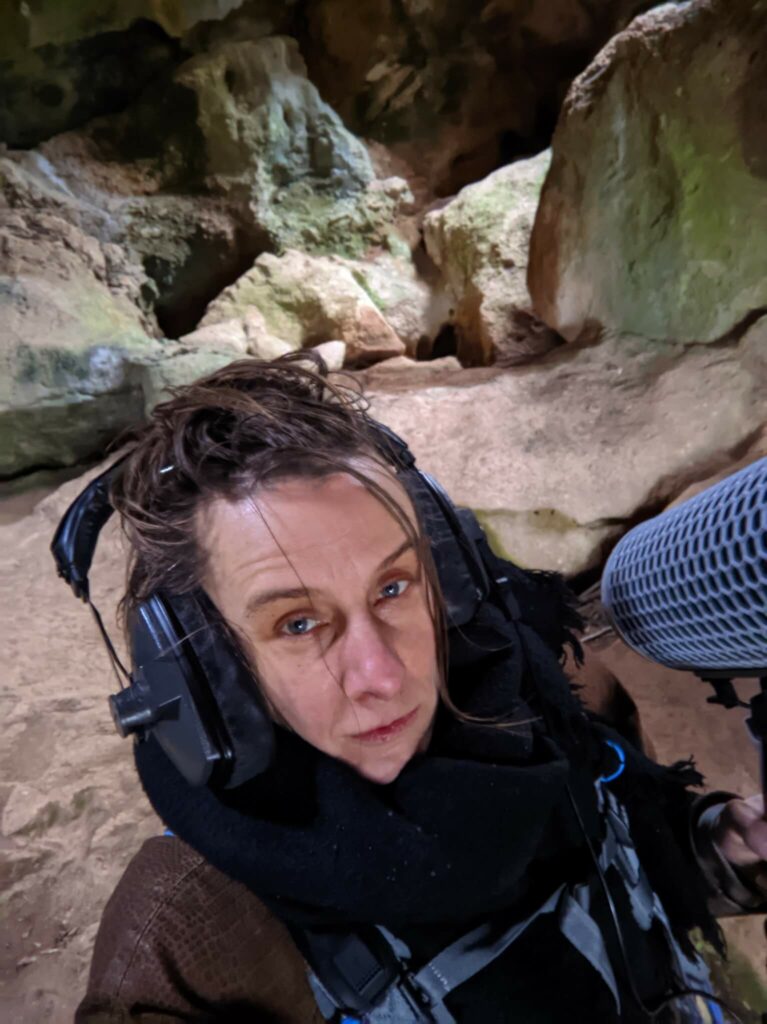Tuesday 28th February 2023

Donato rouses us once again with the scent of coffee and Cornetti. We feel loved. So much care is taken on our behalf, for our funny little vision of a world in which stones can sing if we only know how to hear them. He proposes that we make a performance workshop for the community to share our ideas and practices, and we are excited to leave an imprint here. We workshop the name for a while, settling on something like “Stone tears” or “Tears of Stone.” Donato proposes an afternoon excursion to scout potential workshop locations.
But for the morning, we take a long drive out of town, turn off a country lane and keep driving along a gravel road that snakes past homesteads guarded by dogs chase away our vehicle.
Leaving the dogs behind, we alight at a cave called Grotta Curo Li Rizzi. Stepping out of the car our eyes fall on some rows of metal bars fixed into a cube of concrete. Its intended purpose is mystifying but to our eyes – as sound artists – it looks like a sound sculpture installed into the landscape. We experiment with them for a while, capturing both short compositions and isolated twangs for future reference.
The cave itself feels like a sentient being. The walls are adorned with formations that evoke the contours of a vulva, a rib cage or a uterus. Yet, the sensation it evokes is not so much uncanny (according to Freud, the thing which triggers a twin feeling of both familiarity and strangeness), but comforting somehow, akin to a homecoming. Though unspoken, it seems to be a feeling we all share.
Therein lies a paradox: it is the human-like attributes that instill a sense of connection, and yet, our anthropomorphizing metaphors simultaneously create a distance. When we say things like “It looks like a vulva” or “Can the stone ‘consent’?” We approach non-human nature in a way that ironically widens the gulf between us. By attempting to enclose this alien thing within human terms to bring it closer to us, we actually shroud these entities, or rather we render them invisible beneath the blinding light of our projections. This raises an important question: can we transcend thought systems that devalue non-human entities, without making them into proxy humanoids?
We breathe, as our eyes adjust to the darkness. Yes. Somehow, when the mind is stilled, it is possible to eencounter the aliveness of the cave without resorting to metaphors.
We begin to sing together, first Adrienne and Donato, and then Kate and Donato. A beautiful, descending melody that repeats itself over and over, the kind of melody that lives in the cracks and croaks in our voices rather than in perfection. Donato says the song reminds him of a boat at sea. He goes on to specify that he is thinking of the boat of migrants that wrecked a few days earlier, scattering hundreds of human beings into the Mediterranean, only a half of whom survived.
The song falls into silence, and we loop through a passage back towards the entrance of the cave. Adrienne stops, words trickle from her lips: a poem of sorts, imagining herself as a cave seeking to uncover the non-human voice that dwells within the human, for the barriers that divide are, in truth, rather more thin than they seem.
As we return to the cars, Adrienne suggests going for coffee so Donato navigates us to a small hotel and wedding venue en route known as I Luoghi di Pitti. We are greeted by Eleanora, the proprietor’s daughter, who guides us through the ancient manor house. Much like Dimora Cagnazzi, this stately home has been lovingly restored from a state of ruin.

We drive on to the verdant cliffs of Pulo di Altamura. The word “pulo” is unique to the Murgia region, and it means “sinkhole” – a depression in the earth’s surface where the ground below has collapsed or otherwise given way. We venture down its steep sides to see whether this is the space for the workshop but there are too few loose rocks or stones around, which would be necessary for the sound-based ritual we have in mind. We pause, the pulo‘s winds whip our hair and clothes and snatch away the very sound of our voices. No, the sheer vastness of the space would swallow any sound we could make.

A short drive to the opposing end of the pulo, where we meet two of Donato’s friends. Together we descend into another cave that opens up in an otherwise inconspicuous field. The walls glisten and the air is thick with the scent of damp earth. We notice a stalactite clinging to the roof, each drop of water reflects the light of the world above before it crashes on the floor. Again, visual metaphors abound our language, “it looks like a nipple”, we say, “like a clit”, “like a cock”.
The cave connects to a ledge that opens out onto a steep drop that descends base of the pulo below. A conversation about the geography of the place develops, as Adrienne, without any knowledge of Italian, begins to feel disconnected, underwater, or rather, buried, as if listening through layers of sediment, dirt and rock. It is true that much meaning and connection happen beyond language, but speech dominates the senses; when present, it excludes all other sensations, even when you cannot understand a word of what is said.